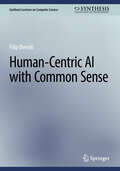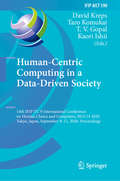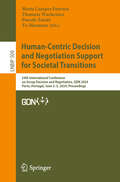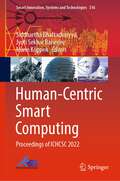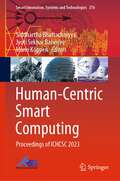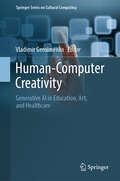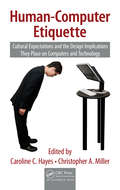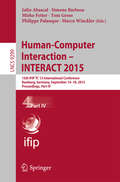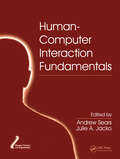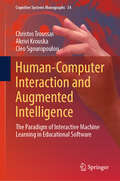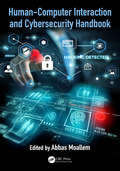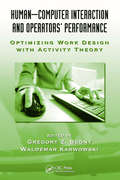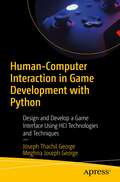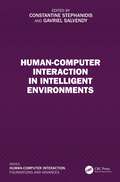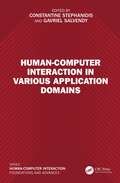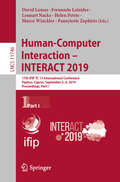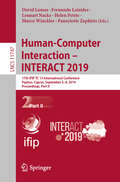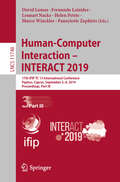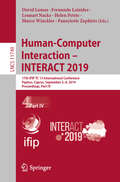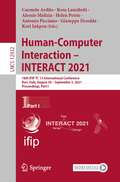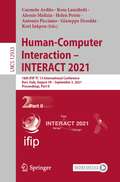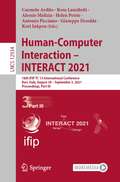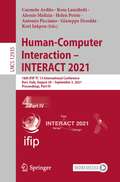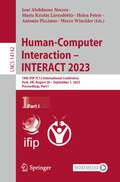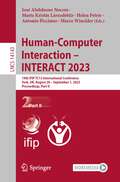- Table View
- List View
Human-Centric AI with Common Sense (Synthesis Lectures on Computer Science)
by Filip IlievskiThis book enables readers to understand the challenges and opportunities of developing human-centered AI with commonsense reasoning abilities. Despite apparent accuracy improvements brought by large neural models across task benchmarks, common sense is still lacking. The lack of common sense affects many tasks, including story understanding, decision-making, and question answering. Commonsense knowledge and reasoning have long been considered the “black matter” of AI, raising concerns about the trustworthiness and applicability of AI methods in both autonomous and hybrid applications. This book describes how to design a more robust, collaborative, explainable, and responsible AI through incorporating neuro-symbolic commonsense reasoning. In addition, the book provides examples of how these properties of AI can facilitate a wide range of social-good applications in digital democracy, traffic monitoring, education, and robotics. What makes commonsense reasoning such a unique and impactful challenge? What can we learn from cognitive research when designing and developing AI systems? How can we approach building responsible, robust, collaborative, and explainable AI with common sense? And finally, what is the impact of this work on human-AI teaming? This book provides an accessible introduction and exploration of these topics.
Human-Centric Computing in a Data-Driven Society: 14th IFIP TC 9 International Conference on Human Choice and Computers, HCC14 2020, Tokyo, Japan, September 9–11, 2020, Proceedings (IFIP Advances in Information and Communication Technology #590)
by David Kreps T. V. Gopal Taro Komukai Kaori IshiiThis book constitutes the refereed proceedings of the 14th IFIP TC 9 International Conference on Human Choice and Computers, HCC14 2020, which was supposed take place in Tokyo, Japan, in September 2020, but the conference was cancelled due to the COVID-19 crisis.The 31 revised full papers presented were carefully reviewed and selected from 55 submissions. The papers deal with the constantly evolving intimate relationship between humans and technology. They are organized in the following sections: ethical and legal considerations in a data-driven society; the data-driven society; peace and war; our digital lives; individuals in data-driven society; and gender, diversity and ICT.
Human-Centric Decision and Negotiation Support for Societal Transitions: 24th International Conference on Group Decision and Negotiation, GDN 2024, Porto, Portugal, June 3–5, 2024, Proceedings (Lecture Notes in Business Information Processing #509)
by Pascale Zaraté Yu Maemura Marta Campos Ferreira Thomasz WachowiczThis book constitutes the refereed proceedings of the 24th International Conference on Group Decision and Negotiation, GDN 2024, which took place in Porto, Portugal, during June 2–5, 2024. The field of Group Decision and Negotiation focuses on decision processes with at least two participants and a common goal but conflicting individual goals. Research areas of Group Decision and Negotiation include electronic negotiations, experiments, the role of emotions in group decision and negotiations, preference elicitation and decision support for group decisions and negotiations, and conflict resolution principles. The 13 full papers presented in this volume were carefully reviewed and selected from 100 submissions. They were organized in the following topical sections: Conflict Resolution; Preference Modeling for Group Decision and Negotiation; Collaborative and Responsible Negotiation Support Systems and Studies.
Human-Centric Smart Computing: Proceedings of ICHCSC 2022 (Smart Innovation, Systems and Technologies #316)
by Mario Köppen Siddhartha Bhattacharyya Jyoti Sekhar BanerjeeThis book includes high-quality research papers presented at the First International Conference on Human-Centric Smart Computing (ICHCSC 2022), organized by the University of Engineering and Management, Jaipur, India, on 27–29 April 2022. The topics covered in the book are human-centric computing, hyper connectivity, and data science. The book presents innovative work by leading academics, researchers, and experts from industry.
Human-Centric Smart Computing: Proceedings of ICHCSC 2023 (Smart Innovation, Systems and Technologies #376)
by Mario Köppen Siddhartha Bhattacharyya Jyoti Sekhar BanerjeeThis book includes high-quality research papers presented at the Second International Conference on Human-Centric Smart Computing (ICHCSC 2023), organized by the University of Engineering and Management, Jaipur, India, on 5–6 July 2023 in New Delhi, India. The topics covered in the book are human-centric computing, hyper connectivity, and data science. The book presents innovative work by leading academics, researchers, and experts from industry.
Human-Computer Creativity: Generative AI in Education, Art, and Healthcare (Springer Series on Cultural Computing)
by Vladimir GeroimenkoThis pioneering volume showcases how generative AI has evolved from a mere tool to a creative partner, transforming the boundaries of innovation and collaboration across various disciplines. With contributions from 53 global experts spanning 21 countries, this comprehensive resource explores the transformative impact of AI on education, art, and healthcare. It reveals how AI enhances learning experiences, fosters new artistic expressions, and revolutionises patient care and medical research. Organised into five thematic parts, the book offers a balanced mix of conceptual frameworks, case studies, and practical insights, providing readers with a thorough understanding of how human ingenuity and artificial intelligence intersect to solve problems, inspire creativity, and redefine industries. Whether you are an academic, practitioner, or inquisitive reader, this volume invites you to engage with the cutting-edge possibilities of generative AI and embrace the future of human-computer collaboration.
Human-Computer Etiquette: Cultural Expectations and the Design Implications They Place on Computers and Technology (Supply Chain Integration Modeling, Optimization and Application)
by Caroline C. Hayes Christopher A. MillerWritten by experts from various fields, this edited collection explores a wide range of issues pertaining to how computers evoke human social expectations. The book illustrates how socially acceptable conventions can strongly impact the effectiveness of human-computer interactions and how to consider such norms in the design of human-computer inter
Human-Computer Interaction - INTERACT 2015
by Tom Gross Marco Winckler Philippe Palanque Julio Abascal Simone Barbosa Mirko FetterThe four-volume set LNCS 9296-9299 constitutes the refereed proceedings of the 15th IFIP TC13 International Conference on Human-Computer Interaction, INTERACT 2015, held in Bamberg, Germany, in September 2015. The 41 papers included in the first volume are organized in topical sections on accessibility; accessible interfaces for blind people; accessible interfaces for older adults; affective HCI and emotions and motivational aspects; alternative input; alternative input devices for people with disabilities; interfaces for cognitive support; brain-computer interaction; cognitive factors.
Human-Computer Interaction Fundamentals (Human Factors and Ergonomics)
by Julie A. Jacko Andrew SearsHailed on first publication as a compendium of foundational principles and cutting-edge research, The Human-Computer Interaction Handbook has become the gold standard reference in this field. Derived from select chapters of this groundbreaking and authoritative resource, Human-Computer Interaction Fundamentals emphasizes emerging topics such as sen
Human-Computer Interaction and Augmented Intelligence: The Paradigm of Interactive Machine Learning in Educational Software (Cognitive Systems Monographs #34)
by Christos Troussas Akrivi Krouska Cleo SgouropoulouThis book explores the transformative roles of human-computer interaction (HCI) and augmented intelligence (AI) in shaping intelligent systems. HCI focuses on designing interactive systems that enhance human-technology relationships, while AI empowers users with adaptive, data-driven tools that complement decision-making. Together, these fields drive innovation, creating systems that are efficient, intuitive, and inclusive, addressing diverse user needs across various domains. Central to this work is the paradigm of interactive machine learning (IML), which builds on HCI and AI principles to create adaptive systems capable of evolving in real-time. The book highlights the application of IML in educational software, demonstrating how dynamic, personalized, and responsive learning environments can enhance student engagement and success. It provides detailed case studies and practical examples that showcase how IML aligns educational content, feedback, and interactions with learner behaviors and preferences. Additionally, it includes numerous Python code implementations and actionable design strategies, making these concepts accessible to practitioners and researchers alike. Key topics include leveraging cognitive and communication styles to shape adaptive systems, integrating learning models to enhance personalization, and addressing ethical considerations such as data privacy and algorithmic fairness. Readers will also discover discussions on creating personalized tutoring systems, collaborative platforms, and immersive environments that redefine educational technology. This book is a valuable resource for researchers, software developers, educators, instructional designers, and technologists at the intersection of human-computer interaction, augmented intelligence, and educational innovation. With its comprehensive framework and practical insights, it offers the tools to design adaptive, inclusive, and impactful learning systems for the future.
Human-Computer Interaction and Cybersecurity Handbook (Human Factors and Ergonomics)
by Abbas Moallem<P><P>Recipient of the SJSU San Jose State University Annual Author & Artist Awards 2019 <P><P>Recipient of the SJSU San Jose State University Annual Author & Artist Awards 2018 <P><P>Cybersecurity, or information technology security, focuses on protecting computers and data from criminal behavior. The understanding of human performance, capability, and behavior is one of the main areas that experts in cybersecurity focus on, both from a human–computer interaction point of view, and that of human factors. This handbook is a unique source of information from the human factors perspective that covers all topics related to the discipline. It includes new areas such as smart networking and devices, and will be a source of information for IT specialists, as well as other disciplines such as psychology, behavioral science, software engineering, and security management. <P><P>Features <li>Covers all areas of human–computer interaction and human factors in cybersecurity <li>Includes information for IT specialists, who often desire more knowledge about the human side of cybersecurity <li>Provides a reference for other disciplines such as psychology, behavioral science, software engineering, and security management <li>Offers a source of information for cybersecurity practitioners in government agencies and private enterprises <li>Presents new areas such as smart networking and devices
Human-Computer Interaction and Operators' Performance: Optimizing Work Design with Activity Theory
by Waldemar Karwowski Gregory Z. BednyA collection of works authored by leading scientists from the US and Russia, Human-Computer Interaction and Operators' Performance: Optimizing Work Design with Activity Theory describes applied and systemic-structural activity theory as it is used to study human-computer interaction, aviation, design, and training. Important from a theoretical and
Human-Computer Interaction in Game Development with Python: Design and Develop a Game Interface Using HCI Technologies and Techniques
by Joseph Thachil George Meghna Joseph GeorgeDeepen your understanding of human-computer interaction (HCI) in game development and learn how to develop video games that grab players and don't let them go. This book explores HCI design in computer games to maximize collaborative and interactive functions. You'll first gain a basic introduction to fundamental concepts and practices of HCI before diving into the fundamental concepts of game interface design and technology. You'll learn how to design a gaming interface through practical examples using Python. This is followed by a brief look at how HCI can offer immersive gaming experiences for players and a review of key elements such as interface, usability, user-centered design, and user interface in terms of efficacy. You will also learn how to implement usability aspects in gaming interfaces with examples using Python. Additionally, the book discusses major challenges that game publishers and developers face, and how they can be resolved using HCI techniques. The question of playability is reviewed throughout the game production process. After working through this book's practical examples, you'll have the knowledge required to begin developing compelling, can't-put-the-controller down games of your own. What You'll LearnMaster HCI tools and methodologies Understand the concept of HCI strategies in the game development cycleDevelop a game in Python using the HCI approachUtilize gamification techniques in Human-Computer InteractionGrasp concepts of usability, user experience and user-centered design processes and their application Who This Book Is ForProgrammers, engineers, and students interested in creating and implementing computer games using HCI technologies. Prior experience with game development is recommended.
Human-Computer Interaction in Intelligent Environments: 5th International Conference, Uahci 2009, Held As Part Of Hci International 2009, San Diego, Ca, Usa, July 19-24, 2009. Proceedings, Part Ii (Lecture Notes In Computer Science Ser. #5615)
by Gavriel Salvendy Constantine StephanidisThis book offers readers a holistic understanding of intelligent environments, encompassingtheir definition, design, interaction paradigms, the role of Artificial Intelligence (AI), and theassociated broader philosophical and procedural aspects. Elaborates on AI research and the creation of intelligent environments. Zooms in on designing interactions with the IoT, intelligent agents and robots. Discusses overarching topics for the design of intelligent environments, including user interface adaptation, design for all, sustainability, cybersecurity, privacy and trust. Provides insights into the intricacies of various intelligent environment contexts, such as in automotive, urban interfaces, smart cities and beyond. This book has been written for individuals interested in Human-Computer Interaction research and applications.
Human-Computer Interaction in Various Application Domains
by Gavriel Salvendy Constantine StephanidisHuman-Computer Interaction (HCI) is a multidisciplinary research and applied field targeted to studying people interacting with information technology and designing usable and efficient systems for them. This book outlines the state‑of‑the‑art of HCI research in the respective domain such as health, games, transportation, industry, and entertainment.This book Bridges the gap between theory and practice by presenting how to apply HCI methods and tools in specific domains. Offers concrete examples of HCI use in real-world situations. Presents case-specific best practices, tips, and tricks. Includes chapters that are well-studied and purposefully selected, representing important theoretical, practical, and research areas in HCI. Includes domains ranging from the roots and the classic approaches of human-computer interaction to contemporary advancements. This book is a fascinating read for individuals interested in Human-Computer Interaction research and applications.
Human-Computer Interaction – INTERACT 2019: 17th IFIP TC 13 International Conference, Paphos, Cyprus, September 2–6, 2019, Proceedings, Part I (Lecture Notes in Computer Science #11746)
by David Lamas Marco Winckler Panayiotis Zaphiris Helen Petrie Fernando Loizides Lennart NackeThe four-volume set LNCS 11746–11749 constitutes the proceedings of the 17th IFIP TC 13 International Conference on Human-Computer Interaction, INTERACT 2019, held in Paphos, Cyprus, in September 2019. The total of 111 full papers presented together with 55 short papers and 48 other papers in these books was carefully reviewed and selected from 385 submissions. The contributions are organized in topical sections named: Part I: accessibility design principles; assistive technology for cognition and neurodevelopment disorders; assistive technology for mobility and rehabilitation; assistive technology for visually impaired; co-design and design methods; crowdsourcing and collaborative work; cyber security and e-voting systems; design methods; design principles for safety/critical systems. Part II: e-commerce; education and HCI curriculum I; education and HCI curriculum II; eye-gaze interaction; games and gamification; human-robot interaction and 3D interaction; information visualization; information visualization and augmented reality; interaction design for culture and development I. Part III: interaction design for culture and development II; interaction design for culture and development III; interaction in public spaces; interaction techniques for writing and drawing; methods for user studies; mobile HCI; personalization and recommender systems; pointing, touch, gesture and speech-based interaction techniques; social networks and social media interaction. Part IV: user modelling and user studies; user experience; users’ emotions, feelings and perception; virtual and augmented reality I; virtual and augmented reality II; wearable and tangible interaction; courses; demonstrations and installations; industry case studies; interactive posters; panels; workshops.The chapter ‘Analyzing Accessibility Barriers Using Cost-Benefit Analysis to Design Reliable Navigation Services for Wheelchair Users’ is open access under a CC BY 4.0 license.
Human-Computer Interaction – INTERACT 2019: 17th IFIP TC 13 International Conference, Paphos, Cyprus, September 2–6, 2019, Proceedings, Part II (Lecture Notes in Computer Science #11747)
by David Lamas Marco Winckler Panayiotis Zaphiris Helen Petrie Fernando Loizides Lennart NackeThe four-volume set LNCS 11746–11749 constitutes the proceedings of the 17th IFIP TC 13 International Conference on Human-Computer Interaction, INTERACT 2019, held in Paphos, Cyprus, in September 2019.The total of 111 full papers presented together with 55 short papers and 48 other papers in these books was carefully reviewed and selected from 385 submissions. The contributions are organized in topical sections named:Part I: accessibility design principles; assistive technology for cognition and neurodevelopment disorders; assistive technology for mobility and rehabilitation; assistive technology for visually impaired; co-design and design methods; crowdsourcing and collaborative work; cyber security and e-voting systems; design methods; design principles for safety/critical systems. Part II: e-commerce; education and HCI curriculum I; education and HCI curriculum II; eye-gaze interaction; games and gamification; human-robot interaction and 3D interaction; information visualization; information visualization and augmented reality; interaction design for culture and development I. Part III: interaction design for culture and development II; interaction design for culture and development III; interaction in public spaces; interaction techniques for writing and drawing; methods for user studies; mobile HCI; personalization and recommender systems; pointing, touch, gesture and speech-based interaction techniques; social networks and social media interaction. Part IV: user modelling and user studies; user experience; users’ emotions, feelings and perception; virtual and augmented reality I; virtual and augmented reality II; wearable and tangible interaction; courses; demonstrations and installations; industry case studies; interactive posters; panels; workshops.
Human-Computer Interaction – INTERACT 2019: 17th IFIP TC 13 International Conference, Paphos, Cyprus, September 2–6, 2019, Proceedings, Part III (Lecture Notes in Computer Science #11748)
by David Lamas Marco Winckler Panayiotis Zaphiris Helen Petrie Fernando Loizides Lennart NackeThe four-volume set LNCS 11746–11749 constitutes the proceedings of the 17th IFIP TC 13 International Conference on Human-Computer Interaction, INTERACT 2019, held in Paphos, Cyprus, in September 2019.The total of 111 full papers presented together with 55 short papers and 48 other papers in these books was carefully reviewed and selected from 385 submissions. The contributions are organized in topical sections named:Part I: accessibility design principles; assistive technology for cognition and neurodevelopment disorders; assistive technology for mobility and rehabilitation; assistive technology for visually impaired; co-design and design methods; crowdsourcing and collaborative work; cyber security and e-voting systems; design methods; design principles for safety/critical systems. Part II: e-commerce; education and HCI curriculum I; education and HCI curriculum II; eye-gaze interaction; games and gamification; human-robot interaction and 3D interaction; information visualization; information visualization and augmented reality; interaction design for culture and development I. Part III: interaction design for culture and development II; interaction design for culture and development III; interaction in public spaces; interaction techniques for writing and drawing; methods for user studies; mobile HCI; personalization and recommender systems; pointing, touch, gesture and speech-based interaction techniques; social networks and social media interaction. Part IV: user modelling and user studies; user experience; users’ emotions, feelings and perception; virtual and augmented reality I; virtual and augmented reality II; wearable and tangible interaction; courses; demonstrations and installations; industry case studies; interactive posters; panels; workshops.
Human-Computer Interaction – INTERACT 2019: 17th IFIP TC 13 International Conference, Paphos, Cyprus, September 2–6, 2019, Proceedings, Part IV (Lecture Notes in Computer Science #11749)
by David Lamas Marco Winckler Panayiotis Zaphiris Helen Petrie Fernando Loizides Lennart NackeThe four-volume set LNCS 11746–11749 constitutes the proceedings of the 17th IFIP TC 13 International Conference on Human-Computer Interaction, INTERACT 2019, held in Paphos, Cyprus, in September 2019.The total of 111 full papers presented together with 55 short papers and 48 other papers in these books was carefully reviewed and selected from 385 submissions. The contributions are organized in topical sections named:Part I: accessibility design principles; assistive technology for cognition and neurodevelopment disorders; assistive technology for mobility and rehabilitation; assistive technology for visually impaired; co-design and design methods; crowdsourcing and collaborative work; cyber security and e-voting systems; design methods; design principles for safety/critical systems. Part II: e-commerce; education and HCI curriculum I; education and HCI curriculum II; eye-gaze interaction; games and gamification; human-robot interaction and 3D interaction; information visualization; information visualization and augmented reality; interaction design for culture and development I. Part III: interaction design for culture and development II; interaction design for culture and development III; interaction in public spaces; interaction techniques for writing and drawing; methods for user studies; mobile HCI; personalization and recommender systems; pointing, touch, gesture and speech-based interaction techniques; social networks and social media interaction. Part IV: user modelling and user studies; user experience; users’ emotions, feelings and perception; virtual and augmented reality I; virtual and augmented reality II; wearable and tangible interaction; courses; demonstrations and installations; industry case studies; interactive posters; panels; workshops.The chapter ‘Experiencing Materialized Reading: Individuals’ Encounters with Books’ is open access under a CC BY 4.0 license at link.springer.com.The chapter ‘What Is Beautiful Continues to Be Good: People Images and Algorithmic Inferences on Physical Attractiveness’ is open access under a CC BY 4.0 license at link.springer.com.
Human-Computer Interaction – INTERACT 2021: 18th IFIP TC 13 International Conference, Bari, Italy, August 30 – September 3, 2021, Proceedings, Part I (Lecture Notes in Computer Science #12932)
by Helen Petrie Alessio Malizia Carmelo Ardito Rosa Lanzilotti Antonio Piccinno Giuseppe Desolda Kori InkpenThe five-volume set LNCS 12932-12936 constitutes the proceedings of the 18th IFIP TC 13 International Conference on Human-Computer Interaction, INTERACT 2021, held in Bari, Italy, in August/September 2021.The total of 105 full papers presented together with 72 short papers and 70 other papers in these books was carefully reviewed and selected from 680 submissions. The contributions are organized in topical sections named: Part I: affective computing; assistive technology for cognition and neurodevelopment disorders; assistive technology for mobility and rehabilitation; assistive technology for visually impaired; augmented reality; computer supported cooperative work. Part II: COVID-19 & HCI; croudsourcing methods in HCI; design for automotive interfaces; design methods; designing for smart devices & IoT; designing for the elderly and accessibility; education and HCI; experiencing sound and music technologies; explainable AI. Part III: games and gamification; gesture interaction; human-centered AI; human-centered development of sustainable technology; human-robot interaction; information visualization; interactive design and cultural development. Part IV: interaction techniques; interaction with conversational agents; interaction with mobile devices; methods for user studies; personalization and recommender systems; social networks and social media; tangible interaction; usable security. Part V: user studies; virtual reality; courses; industrial experiences; interactive demos; panels; posters; workshops. The chapter ‘Stress Out: Translating Real-World Stressors into Audio-Visual Stress Cues in VR for Police Training’ is open access under a CC BY 4.0 license at link.springer.com. The chapter ‘WhatsApp in Politics?! Collaborative Tools Shifting Boundaries’ is open access under a CC BY 4.0 license at link.springer.com.
Human-Computer Interaction – INTERACT 2021: 18th IFIP TC 13 International Conference, Bari, Italy, August 30 – September 3, 2021, Proceedings, Part II (Lecture Notes in Computer Science #12933)
by Helen Petrie Alessio Malizia Carmelo Ardito Rosa Lanzilotti Antonio Piccinno Giuseppe Desolda Kori InkpenThe five-volume set LNCS 12932-12936 constitutes the proceedings of the 18th IFIP TC 13 International Conference on Human-Computer Interaction, INTERACT 2021, held in Bari, Italy, in August/September 2021.The total of 105 full papers presented together with 72 short papers and 70 other papers in these books was carefully reviewed and selected from 680 submissions. The contributions are organized in topical sections named: Part I: affective computing; assistive technology for cognition and neurodevelopment disorders; assistive technology for mobility and rehabilitation; assistive technology for visually impaired; augmented reality; computer supported cooperative work. Part II: COVID-19 & HCI; croudsourcing methods in HCI; design for automotive interfaces; design methods; designing for smart devices & IoT; designing for the elderly and accessibility; education and HCI; experiencing sound and music technologies; explainable AI. Part III: games and gamification; gesture interaction; human-centered AI; human-centered development of sustainable technology; human-robot interaction; information visualization; interactive design and cultural development. Part IV: interaction techniques; interaction with conversational agents; interaction with mobile devices; methods for user studies; personalization and recommender systems; social networks and social media; tangible interaction; usable security. Part V: user studies; virtual reality; courses; industrial experiences; interactive demos; panels; posters; workshops. The chapter ‘Stress Out: Translating Real-World Stressors into Audio-Visual Stress Cues in VR for Police Training’ is open access under a CC BY 4.0 license at link.springer.com. The chapter ‘WhatsApp in Politics?! Collaborative Tools Shifting Boundaries’ is open access under a CC BY 4.0 license at link.springer.com.
Human-Computer Interaction – INTERACT 2021: 18th IFIP TC 13 International Conference, Bari, Italy, August 30 – September 3, 2021, Proceedings, Part III (Lecture Notes in Computer Science #12934)
by Helen Petrie Alessio Malizia Carmelo Ardito Rosa Lanzilotti Antonio Piccinno Giuseppe Desolda Kori InkpenThe five-volume set LNCS 12932-12936 constitutes the proceedings of the 18th IFIP TC 13 International Conference on Human-Computer Interaction, INTERACT 2021, held in Bari, Italy, in August/September 2021.The total of 105 full papers presented together with 72 short papers and 70 other papers in these books was carefully reviewed and selected from 680 submissions. The contributions are organized in topical sections named: Part I: affective computing; assistive technology for cognition and neurodevelopment disorders; assistive technology for mobility and rehabilitation; assistive technology for visually impaired; augmented reality; computer supported cooperative work. Part II: COVID-19 & HCI; croudsourcing methods in HCI; design for automotive interfaces; design methods; designing for smart devices & IoT; designing for the elderly and accessibility; education and HCI; experiencing sound and music technologies; explainable AI. Part III: games and gamification; gesture interaction; human-centered AI; human-centered development of sustainable technology; human-robot interaction; information visualization; interactive design and cultural development. Part IV: interaction techniques; interaction with conversational agents; interaction with mobile devices; methods for user studies; personalization and recommender systems; social networks and social media; tangible interaction; usable security. Part V: user studies; virtual reality; courses; industrial experiences; interactive demos; panels; posters; workshops. The chapter ‘Stress Out: Translating Real-World Stressors into Audio-Visual Stress Cues in VR for Police Training’ is open access under a CC BY 4.0 license at link.springer.com. The chapter ‘WhatsApp in Politics?! Collaborative Tools Shifting Boundaries’ is open access under a CC BY 4.0 license at link.springer.com.
Human-Computer Interaction – INTERACT 2021: 18th IFIP TC 13 International Conference, Bari, Italy, August 30 – September 3, 2021, Proceedings, Part IV (Lecture Notes in Computer Science #12935)
by Helen Petrie Alessio Malizia Carmelo Ardito Rosa Lanzilotti Antonio Piccinno Giuseppe Desolda Kori InkpenThe five-volume set LNCS 12932-12936 constitutes the proceedings of the 18th IFIP TC 13 International Conference on Human-Computer Interaction, INTERACT 2021, held in Bari, Italy, in August/September 2021.The total of 105 full papers presented together with 72 short papers and 70 other papers in these books was carefully reviewed and selected from 680 submissions. The contributions are organized in topical sections named: Part I: affective computing; assistive technology for cognition and neurodevelopment disorders; assistive technology for mobility and rehabilitation; assistive technology for visually impaired; augmented reality; computer supported cooperative work. Part II: COVID-19 & HCI; croudsourcing methods in HCI; design for automotive interfaces; design methods; designing for smart devices & IoT; designing for the elderly and accessibility; education and HCI; experiencing sound and music technologies; explainable AI. Part III: games and gamification; gesture interaction; human-centered AI; human-centered development of sustainable technology; human-robot interaction; information visualization; interactive design and cultural development. Part IV: interaction techniques; interaction with conversational agents; interaction with mobile devices; methods for user studies; personalization and recommender systems; social networks and social media; tangible interaction; usable security. Part V: user studies; virtual reality; courses; industrial experiences; interactive demos; panels; posters; workshops. The chapter ‘Stress Out: Translating Real-World Stressors into Audio-Visual Stress Cues in VR for Police Training’ is open access under a CC BY 4.0 license at link.springer.com. The chapter ‘WhatsApp in Politics?! Collaborative Tools Shifting Boundaries’ is open access under a CC BY 4.0 license at link.springer.com.
Human-Computer Interaction – INTERACT 2023: 19th IFIP TC13 International Conference, York, UK, August 28 – September 1, 2023, Proceedings, Part I (Lecture Notes in Computer Science #14142)
by José Abdelnour Nocera Marco Winckler Helen Petrie Marta Kristín Lárusdóttir Antonio PiccinnoThe four-volume set LNCS 14442 -14445 constitutes the proceedings of the 19th IFIP TC 13 International Conference on Human-Computer Interaction, INTERACT 2023, held in York, UK, in August/September 2023. The 71 full papers and 58 short papers included in this book were carefully reviewed and selected from 406 submissions. They were organized in topical sections as follows: 3D Interaction; Accessibility; Accessibility and Aging; Accessibility for Auditory/Hearing Disabilities; Co-Design; Cybersecurity and Trust; Data Physicalisation and Cross-device; Eye-Free, Gesture Interaction and Sign Language; Haptic interaction and Healthcare applications; Self-Monitoring; Human-Robot Interaction; Information Visualization; Information Visualization and 3D Interaction; Interacting with Children; Interaction with Conversational Agents; Methodologies for HCI; Model-Based UI Design and Testing; Montion Sickness, Stress and Risk perception in 3D Environments and Multisensory interaction; VR experiences; Natural Language Processing and AI Explainability; Online Collaboration and Cooperative work; Recommendation Systems and AI Explainability; Social AI; Social and Ubiquitous Computing; Social Media and Digital Learning; Understanding Users and Privacy Issues; User movement and 3D Environments; User Self-Report; User Studies; User Studies, Eye-Tracking, and Physiological Data; Virtual Reality; Virtual Reality and Training; Courses; Industrial Experiences; Interactive Demonstrations; Keynotes; Panels; Posters; and Workshops.
Human-Computer Interaction – INTERACT 2023: 19th IFIP TC13 International Conference, York, UK, August 28 – September 1, 2023, Proceedings, Part II (Lecture Notes in Computer Science #14143)
by José Abdelnour Nocera Marco Winckler Helen Petrie Marta Kristín Lárusdóttir Antonio PiccinnoThe four-volume set LNCS 14442 -14445 constitutes the proceedings of the 19th IFIP TC 13 International Conference on Human-Computer Interaction, INTERACT 2023, held in York, UK, in August/September 2023. The 71 full papers and 58 short papers included in this book were carefully reviewed and selected from 406 submissions. They were organized in topical sections as follows: 3D Interaction; Accessibility; Accessibility and Aging; Accessibility for Auditory/Hearing Disabilities; Co-Design; Cybersecurity and Trust; Data Physicalisation and Cross-device; Eye-Free, Gesture Interaction and Sign Language; Haptic interaction and Healthcare applications; Self-Monitoring; Human-Robot Interaction; Information Visualization; Information Visualization and 3D Interaction; Interacting with Children; Interaction with Conversational Agents; Methodologies for HCI; Model-Based UI Design and Testing; Montion Sickness, Stress and Risk perception in 3D Environments and Multisensory interaction; VR experiences; Natural Language Processing and AI Explainability; Online Collaboration and Cooperative work; Recommendation Systems and AI Explainability; Social AI; Social and Ubiquitous Computing; Social Media and Digital Learning; Understanding Users and Privacy Issues; User movement and 3D Environments; User Self-Report; User Studies; User Studies, Eye-Tracking, and Physiological Data; Virtual Reality; Virtual Reality and Training; Courses; Industrial Experiences; Interactive Demonstrations; Keynotes; Panels; Posters; and Workshops.
